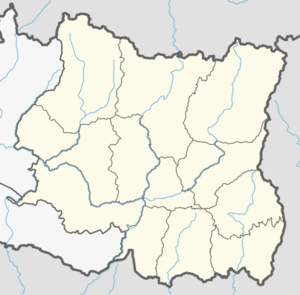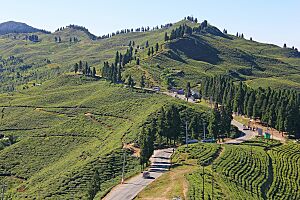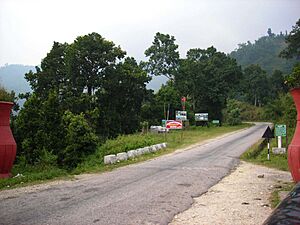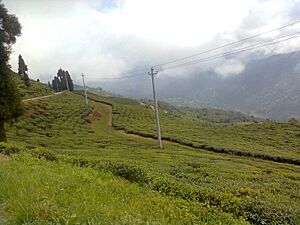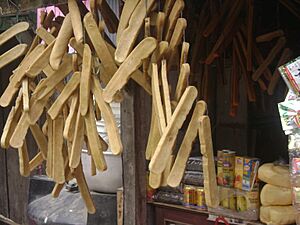Ilam Municipality facts for kids
Quick facts for kids
Ilam
इलाम
Charkhola
|
|
|---|---|
|
Municipality
|
|
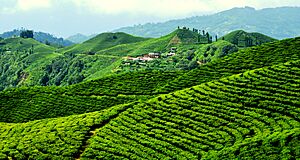
Lush Green Tea Gardens are what makes Ilam district popular.
|
|
| Motto(s):
Clean, Prosperous, Cultured Ilam
|
|
| Country | |
| Province | Koshi Province |
| District | Ilam District |
| Established as Gauda | 1818 (1875 BS) |
| Established as Municipality | 1958 |
| Area | |
| • Total | 173.32 km2 (66.92 sq mi) |
| Elevation | 1,627 m (5,338 ft) |
| Population
(2021)
|
|
| • Total | 50,085 |
| • Density | 288.974/km2 (748.440/sq mi) |
| • Ethnicities |
|
| • Religions | Kiratism Hinduism and Buddhist |
| Time zone | UTC+5:45 (NST) |
| Postal Code |
57300
|
| Area code(s) | 027 |
| Language | Limbu, Nepali and English |
Ilam (Nepali: इलाम) is a cool town in eastern Nepal. It's located in the Mahabharata hills of Koshi Province. Ilam is the main city of Ilam District. It's super famous for its beautiful Nepali tea gardens. These tea farms are a big draw for tourists! Ilam also has amazing natural views and a strong farming economy. They grow many special crops here.
The town covers about 173 square kilometers. In 2011, about 48,536 people lived here. The town is split into 12 smaller areas called wards. A highway called Mechi Highway connects Ilam to other big roads. This makes it easy to travel to Biratnagar, the capital city of Koshi Province.
Contents
History of Ilam
Ilam Bazar, the main part of Ilam, became the headquarters of Ilam Gauda in 1818. It was officially named "Ilam Municipality" in 1958. This change was made public in 1962.
During a time called the Panchayat System in Nepal (around 1960), Ilam was known as Ilam Nagar Panchayat. After this system ended in 1990, Ilam got its original name back: Ilam Municipality.
In 2015, some nearby villages joined Ilam Municipality. These included Godak, Soyak, Barbote, and parts of Maipokhari, Sumbek, Puwamajhuwa, Sangrumba, Siddhithumka, and Sakhejung. This made the municipality bigger.
What's in a Name?
The name ‘Ilam’ comes from two words in the Limbu language: ‘I’ and ‘Lam’. ‘I’ means ‘winding’ and ‘lam’ means ‘way’. If you visit Ilam, you'll see many winding paths everywhere. This name perfectly describes the area!
People of Ilam
Ilam is home to many different groups of people. According to the 2011 Nepal census, about 48,563 people lived here. The main groups include Limbu, Rai, Yakkha, Lepcha, Newar, Magar, Tamang, Chettri, Bahun, Sunuwar, and Gurung.
By 2021, the population grew to 50,085 people. Almost everyone (99.7%) living in Ilam is a Nepali citizen. Also, most people (86.7%) could read and write in 2021.
Learning in Ilam
Ilam has many schools and colleges. A big college here is Mahendra Ratna Multiple Campus. It's part of Tribhuvan University and was the first campus to get a special quality certificate.
This campus offers studies in science, humanities, education, and business. Since 2012, it also offers a bachelor's degree in Horticulture (the science of growing plants). Students from all over Nepal come here to study horticulture.
Other places for higher education include Adarhsa HSS, Modern Campus, and Ilam Technical College. Green Valley Academy is a well-known secondary school. It's considered one of the best in eastern Nepal for its high test results.
Getting Around Ilam
Ilam Bazaar is about 700 kilometers east of Kathmandu. You can take a bus from Kathmandu to Ilam. The bus ride takes about 16 hours. There's also an airport being built at Sukilumba Danda.
Buses and other vehicles are available daily from Ilam to many other towns. These include Taplejung, Phidim, Birtamod, and even Siliguri in India. There's also a new bus park being built at Sera. You can also find transport to all the villages in Ilam district.
Tea Production in Ilam
Tea growing in Ilam started a long time ago, in 1863. The Chinese government gave tea plants to the Prime Minister of Nepal back then. These plants were then grown in Ilam.
In 1868, the first tea factory in Ilam was built. Tea farms covered a lot of land. The original tea factory was sold to a private company in 2010 and is not running now. However, tea production is still a big deal in Ilam. Many local people work in the tea industry.
In 2010, Nepal produced over 16 million kilograms of tea each year. Most of this tea comes from Ilam!
Ilam's Economy
Ilam is becoming a popular place for tourists, so new hotels are opening up. Ilam is famous for its "six A's" which are important products:
- Alu (Potato)
- Alan (Milk)
- Alainchi (Cardamom)
- Aduwa (Ginger)
- Amriso (Broom Grass)
- Akabare khursani (Round Chillies)
Besides these, Ilam also produces tea, bamboo, flowers, and silk. All these farm products help the local economy grow. Tourism also adds a lot to Ilam's economy.
Ilam Bazaar has a special market called a haat every Sunday and Thursday. People come to buy and sell goods there.
Climate in Ilam
The weather in Ilam changes with the seasons. It gets cold in winter. Summers are mild and pleasant. During the monsoon season, it can be quite foggy.
| Climate data for Ilam (Ilam Tea Estate), elevation 1,300 m (4,300 ft), (1976–2005) | |||||||||||||
|---|---|---|---|---|---|---|---|---|---|---|---|---|---|
| Month | Jan | Feb | Mar | Apr | May | Jun | Jul | Aug | Sep | Oct | Nov | Dec | Year |
| Mean daily maximum °C (°F) | 16.1 (61.0) |
17.9 (64.2) |
22.0 (71.6) |
24.9 (76.8) |
25.2 (77.4) |
25.5 (77.9) |
24.8 (76.6) |
25.2 (77.4) |
24.7 (76.5) |
23.6 (74.5) |
21.2 (70.2) |
18.0 (64.4) |
22.4 (72.4) |
| Mean daily minimum °C (°F) | 9.2 (48.6) |
10.6 (51.1) |
14.2 (57.6) |
16.8 (62.2) |
18.0 (64.4) |
19.7 (67.5) |
19.8 (67.6) |
20.0 (68.0) |
19.1 (66.4) |
17.2 (63.0) |
14.2 (57.6) |
11.0 (51.8) |
15.8 (60.5) |
| Average precipitation mm (inches) | 13.6 (0.54) |
16.3 (0.64) |
24.9 (0.98) |
61.6 (2.43) |
132.5 (5.22) |
295.8 (11.65) |
466.7 (18.37) |
366.2 (14.42) |
229.9 (9.05) |
73.4 (2.89) |
12.6 (0.50) |
10.4 (0.41) |
1,709.3 (67.30) |
| Source: Agricultural Extension in South Asia | |||||||||||||
Caring for the Environment
Ilam Municipality is known for its cool ideas to protect the environment. In 2010, it became the first place in Nepal to ban plastic bags in markets. This was a huge success!
In the same year, the district set aside a large area of land (over 19,000 square meters) to process waste that can break down naturally. Also, Ilam has a special system of small hydropower plants. These plants provide more reliable electricity than many other parts of Nepal.
Media and News
Ilam has several local radio stations. These include Ilam FM (93 MHz), Nepalbani FM (94.9 MHz), Chiyabari FM (88.2 MHz), and Fikkal FM (90.6 MHz). These are community radio stations. They play music and share news to promote local culture.
There are also daily newspapers published in Ilam, such as Chiyabari Daily, Ilam Express, Ilam Post, and Sandakpur. Weekly newspapers like Pawanbhumi and Ilam Awaj are also published here.
Images for kids
 | Laphonza Butler |
 | Daisy Bates |
 | Elizabeth Piper Ensley |


